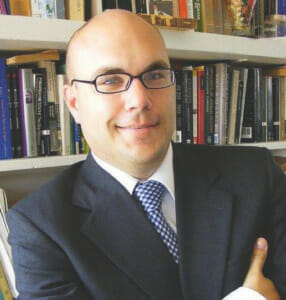Satisfied and Happier: Unexpected Neurochemical Benefits of Getting Older

The Latest News and Updates from the Division of Politics & Economics Community
Oxytocin & Aging: In his continuing research that sheds intriguing light on aspects of life, happiness, behavior, and trust, Professor of Economic Sciences Paul Zak and his fellow researchers have released a new study about the impact of oxytocin on people as they age.
People whose brains release more of the neurochemical oxytocin are kinder to others and are more satisfied with their lives. This is the finding of new research, published in Frontiers in Behavioral Neuroscience, that also discovered that oxytocin release increases with age, showing why, on average, people are more caring as they get older.
“The findings of our study are consistent with many religions and philosophies, where satisfaction with one’s life is enhanced by helping others,” reported Zak, the new study’s first author. “Participants in our study who released the most oxytocin were more generous to charity when given the opportunity and performed many other helping behaviors. The change in oxytocin was also positively related to participants’ empathy, religious participation, and gratitude.”
Getting older and feeling happier
is not a coincidence.
The researchers recruited more than 100 people for the study, ranging between the ages of 18 and 99. They were each shown a video about a little boy with cancer, which previous work had confirmed to induce oxytocin release in the brain. Blood was taken before and after the video to measure the change in oxytocin.
Participants had the option to donate some of their earnings from the study to a childhood cancer charity, and this was used to measure their immediate prosocial behavior. The team of researchers also collected data on their emotional states and found that the release of oxytocin increased with the age of participants.
“We have previously shown a link between how kind and generous people are, known as prosocial behaviors, and the release of oxytocin,” said Zak. “Seniors spend more time volunteering and donate a larger proportion of their income to charity than do younger people, so we wanted to see if there was a neurochemical basis for these behaviors.”
***
In Defense of Tribal Gaming: Deron Marquez (PhD, Politics & Policy, 2016) is an expert on tribal governance and gaming, and he’s looking ahead with concern to several potential propositions looming on the ballot this November in California.
All of the propositions would weaken—or completely erase—any tribal gaming exclusivity provisions in the state. Furthermore, they would expand gaming to give full access to “larger-than-life corporations with no attachment to the Golden State,” writes Marquez in the article “Fruitful Sunny Shadows” in the new issue of Hamiinat, the magazine of the San Manuel Band of Mission Indians.

Gaming, he explains, has provided a critical revenue lifeline to tribes with “little or no ability to generate revenues like traditional governments due to the lack of a taxable land base and with limited federal funding.” That revenue has enabled them to pay for healthcare, education, infrastructure, and other basic needs and support the state and local economy.
But the potential passage of these propositions could result in considerable financial challenges for tribes and their surrounding communities.
San Manuel chair from 1999 to 2006, Marquez ends the piece with a dire warning: “Since tribes provide funding under the current system to tribes and local governments, those dollars will be less. The reign of tribal government gaming will end, and tribes must prepare for the inevitable. New economic engines will be needed.”
***

Where the Classroom Meets the Public Square: A recent profile of Assistant Professor in Political Science Kevin Walker (PhD, Politics & Policy, 2010) in Colgate University’s Colgate Maroon-News looks at Walker’s growth and development as a specialist in education policy.
He explains in the interview that his interest in education policy arose from his work at CGU on his dissertation. He describes how his dissertation focused on the Supreme Court, which also included a chapter on the rise of law schools that “was very intriguing” to him and further explored how university education and American politics have interacted with each other. Walker joined Colgate University two and a half years ago as a visiting professor.